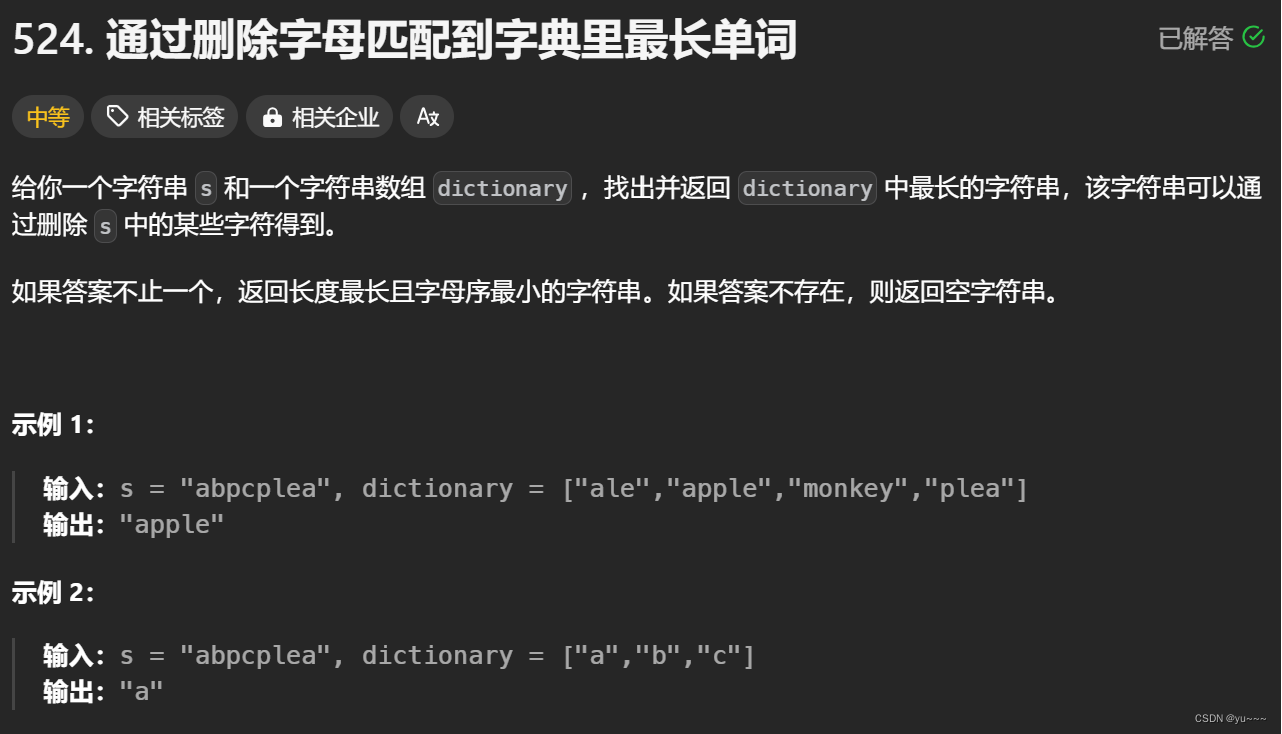力扣题:子序列-12.27
发布时间:2023年12月20日
力扣题-12.27
力扣题1:524. 通过删除字母匹配到字典里最长单词
解题思想:首先先遍历数据获得可能的答案,再对答案进行遍历选择出长度最长的且字母序最小的字符串

class Solution(object):
def findLongestWord(self, s, dictionary):
"""
:type s: str
:type dictionary: List[str]
:rtype: str
"""
answer = []
for i in range(len(dictionary)):
j = 0
k = 0
while j<len(s) and k<len(dictionary[i]):
if s[j] == dictionary[i][k]:
j +=1
k +=1
else:
j +=1
if k == len(dictionary[i]):
answer.append(dictionary[i])
maxlen = 0
result = ''
for i in range(len(answer)):
if len(answer[i]) > maxlen:
result = answer[i]
maxlen = len(answer[i])
elif len(answer[i]) == maxlen:
for char1, char2 in zip(answer[i], result):
if char1 < char2:
result = answer[i]
break
elif char1 > char2:
break
return result
class Solution {
public:
string findLongestWord(string s, vector<string>& dictionary) {
std::vector<std::string> answer;
for (const auto& word : dictionary) {
int j = 0, k = 0;
while (j < s.length() && k < word.length()) {
if (s[j] == word[k]) {
j++;
k++;
} else {
j++;
}
}
if (k == word.length()) {
answer.push_back(word);
}
}
int maxlen = 0;
std::string result = "";
for (const auto& word : answer) {
if (word.length() > maxlen) {
result = word;
maxlen = word.length();
} else if (word.length() == maxlen) {
for (int i = 0; i < word.length(); ++i) {
if (word[i] < result[i]) {
result = word;
break;
} else if (word[i] > result[i]) {
break;
}
}
}
}
return result;
}
};
文章来源:https://blog.csdn.net/yumeng3866/article/details/134983680
本文来自互联网用户投稿,该文观点仅代表作者本人,不代表本站立场。本站仅提供信息存储空间服务,不拥有所有权,不承担相关法律责任。 如若内容造成侵权/违法违规/事实不符,请联系我的编程经验分享网邮箱:chenni525@qq.com进行投诉反馈,一经查实,立即删除!
本文来自互联网用户投稿,该文观点仅代表作者本人,不代表本站立场。本站仅提供信息存储空间服务,不拥有所有权,不承担相关法律责任。 如若内容造成侵权/违法违规/事实不符,请联系我的编程经验分享网邮箱:chenni525@qq.com进行投诉反馈,一经查实,立即删除!
最新文章
- Python教程
- 深入理解 MySQL 中的 HAVING 关键字和聚合函数
- Qt之QChar编码(1)
- MyBatis入门基础篇
- 用Python脚本实现FFmpeg批量转换
- Windows域(域服务器的配置、加入域)
- 多特征变量序列预测-模型代码全家桶
- 向华为学习:基于BLM模型的战略规划研讨会实操的详细说明,含研讨表单(三)
- xilinxi mulitboot 启动
- SpringBoot用JDK1.8的依赖设置pom.xml
- UG扫掠体与部件导航器的使用
- 一篇文章带你了解Nacos的发展史
- docker搭建gitlab
- 揭开Spring MVC的真面目
- 简单了解【多智能体强化学习(MARL)】